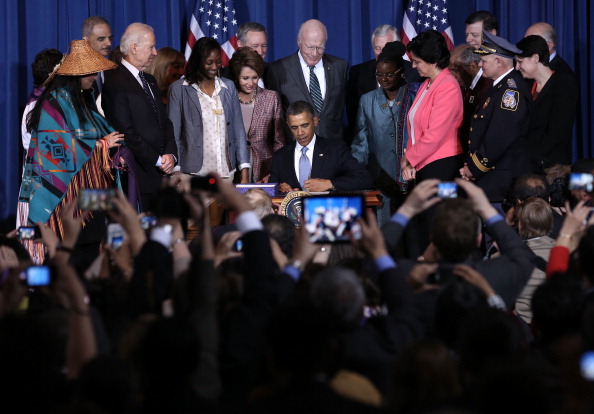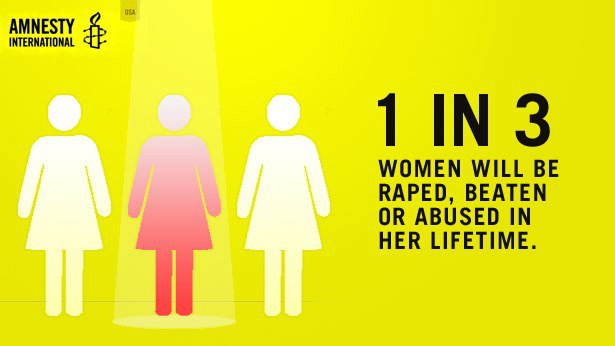
President Obama, , joined by Vice Chairwoman of the Tulalip Tribes of Washington State Deborah Parker, trafficking survivor Tysheena Rhames, Police Chief James Johnson of Baltimore County in Maryland, and Executive Director of New York City Anti-Violence Project Police Department Sharon Stapel, and members of Congress and his adminstration, signs the Violence Against Women Act into law March 7, 2013. (Photo by Alex Wong/Getty Images)
This blog is part of a series on human rights in the State of the Union address. The United States has an obligation to pursue policies that ensure respect for human rights at home and around the world. Follow along and join the conversation using #SOTUrights.
Dear Mr. President,
This State of the Union, will you make women’s rights a priority?
Women across the world—including here in the U.S.—experience horrific levels of violence. 1 of 3 women globally will be raped, beaten, or otherwise abused in their lifetime, and you, Mr. President, can help end this epidemic.
Improving the US response to sexual violence in Indigenous communities
Consider Native American and Alaska Native women, who are 2.5 times more likely to be raped or sexually assaulted than non-Native women in the USA. The extreme levels of sexual violence against Indigenous women make it critical that Indian Health Services implements standardized, written sexual assault protocols. These protocols are needed to ensure the timely collection of forensic evidence which is crucial for a successful prosecution, and which also ensure that Native American and Alaska Native women have access to the health care services they need, including unrestricted access to emergency contraception.
While the Tribal Law and Order Act, which you, Mr. President, signed into law in 2010, required Indian Health Services to develop standardized sexual assault policies and protocols for the facilities of the Service, they are not mandatory and implementation remains a problem. As a result, treatment of sexual assault survivors has been inconsistent and results in violations of human rights under the United Nations Declaration on the Rights of Indigenous Peoples and the Convention on the Elimination of All Forms of Racial Discrimination, as well as other international standards. We call on you to ensure that Indian Health Services adopts and enforces standardized sexual assault protocols that include full and equal access to emergency contraception.
Recommitting to the US Strategy to Prevent and Respond to Gender-Based Violence Globally
Just as the extreme levels of violence against Indigenous women in the USA demands a response, so to does the scourge of violence against women and girls globally. Violence against women is human rights violation, a public health epidemic and a barrier to solving shared global challenges such as poverty, disease, and conflict.
Mr. President, you recognized how important it is for the US government to take a stand against this human rights scandal when you promulgated the US Strategy to Prevent and Respond to Gender-Based Violence (GBV) Globally in August 2012, which seeks to integrate and utilize ongoing foreign assistance efforts aimed at preventing violence from happening in the first place and ensuring proper support for survivors when it does.
Consider survivors such as the Yezidi women and girls in Iraq who are facing harrowing violence at the hands of the armed group calling itself the Islamic State, including torture, rape, other forms of sexual violence and forced marriage. The US GBV Strategy is meant to help ensure access to the kinds of lifesaving services so essential to the Yezidi survivors of sexual violence. But the Strategy is set to expire in August. What will happen to such critical efforts when it does? To the women and girls who need the support the most?
Calling for passage of the International Violence Against Women Act
We must ensure that this important Strategy becomes permanent through passage of the International Violence Against Women Act (IVAWA), a bill which makes addressing GBV a cornerstone of U.S. development and foreign policy.

In the coming weeks, IVAWA will be reintroduced in the 114th Congress, and while Amnesty activists will do our part to push for its passage, we need you to do your part, Mr. President. We need you to support the passage of IVAWA and commit to renewing the US Strategy to Prevent and Respond to Gender-Based Violence Globally before it expires this summer.
Will you be a leader for women and girls in your State of the Union address?
Until everyone, and governments alike, recognizes their responsibility to end violence, the health and safety of women and girls around the world will remain at risk. We call on you to ensure that the United States will continue doing its part by committing to the continued implementation of the GBV Strategy, encouraging Congress to pass IVAWA, and pushing Indian Health Services to take further action to effectively respond to sexual assault. The women and girls of the world cannot afford for you not to.
Julia Drost and Rachel Ward contributed to this blog.
Great Post. How important sexual and reproductive health really is, that it underpins the rights to education, non-discrimination, and so many more, and that it cannot be lost to politics during the CSW or the final SDG negotiations.